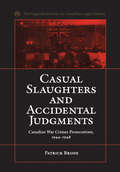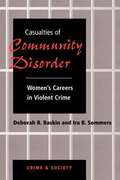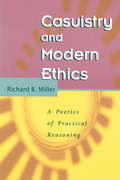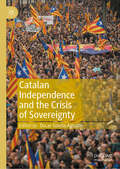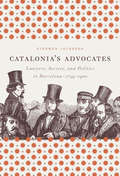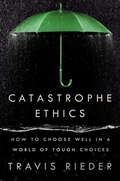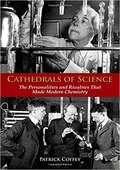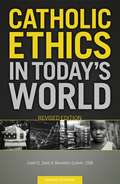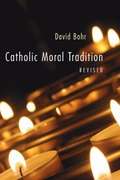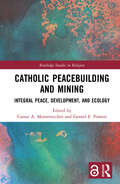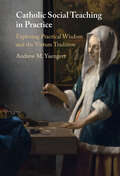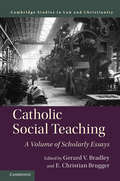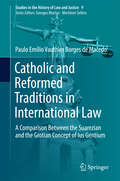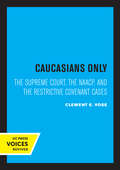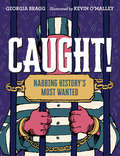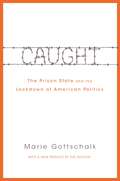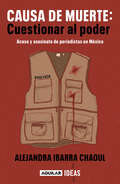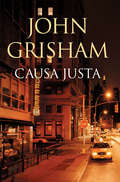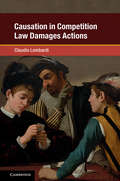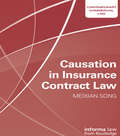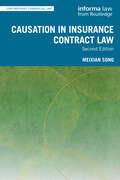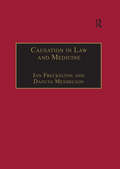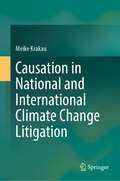- Table View
- List View
Casual Slaughters and Accidental Judgments: Canadian War Crimes Prosecutions 1944-1948
by Patrick BrodeWar crimes prosecutions create unique difficulties as civilian standards of law are applied to the extraordinary circumstances of war. Governments are often surprisingly hesitant to pursue war criminals. Patrick Brode has produced a fascinating study of such issues in Casual Slaughters and Accidental Judgements, a history of Canada's prosecution of war crimes committed during the Second World War. It is a history that includes personalities such as Lt. Col. Bruce Macdonald, whose persistence overcame Ottawa's reluctance to pursue the 'war crimes business,' and SS Brigadeführer Kurt Meyer, whose last-minute reprieve from death by firing squad followed a trial reminiscent of a Hollywood melodrama. Brode illustrates the difficulties of applying law to a recently defeated enemy when the emotions and politics of war distort any sense of impartial justice. The trials also reveal much about the legal and diplomatic views that prevailed at the end of the war and democratic Canada's willingness to overcome its colonial past to defend its own interests on the international stage.<P><P>The objectivity of the trials is still subject to question and they have been condemned by some as retaliatory. Brode clearly shows that Canada's war crimes trials of 1945 to 1948 were a part of a movement to apply humane standards of conduct to warfare. Recent events in places such as Vietnam, Bosnia, and Somalia show how pertinent these concerns remain.
Casualties of Community Disorder: Women's Careers in Violent Crime
by Deborah R. Baskin Ira B. SommersUnlike the outcry over street crime committed by males, concerns about women and violence have centered primarily on their roles as victims of sexual and physical violence committed by strangers and by males in intimate relationships. Rarely is violence by women considered in the development or testing of theories of aggression. The book provides a detailed account of the criminal careers of 170 women who committed violent street crimes in New York City, describing their entry into criminal activities, their development into persistent street criminals, and, for some, their eventual transition out of street crime. Unlike other qualitative works in this area,Casualties of Community Disorder offers more than cultural analysis. Deborah Baskin and Ira Sommers integrate structural and individual levels of explanation by examining the career patterns of female violent offenders and the relationships of these women to family members and communities. Through the use of census data, analyses of political and economic changes, and ethnographic observations of activities specific to these communities, the authors provide a perspective on the relationship of individual decisions to structural constraints. The research presented here clearly challenges contemporary assumptions regarding female offending. Baskin and Sommers' analysis suggests a complex relationship of social and individual factors that serves as a caution against generic and gender-based generalizations that have been drawn from time-bound, aggregate level data sets and from ethnographies of women's involvement in street hustling. Finally, in Casualties of Community Disorder, the street drug and criminal subculture is understood through the words of those who usually are spoken for, studied, and objectified.
Casuistry and Modern Ethics: A Poetics of Practical Reasoning
by Richard B. MillerDid the Gulf War defend moral principle or Western oil interests? Is violent pornography an act of free speech or an act of violence against women? <p><p>In this book the author sheds new light on the potential of casuistry--case-based reasoning--for resolving these and other questions of conscience raised by the practical quandaries of modern life. Rejecting the packaging of moral experience within simple descriptions and inflexible principles, he argues instead for identifying and making sense of the ethically salient features of individual cases. Because this practical approach must cope with a diverse array of experiences, he draws on a wide variety of diagnostic tools from such fields as philosophy of science, legal reasoning, theology, literary theory, hermeneutics, and moral philosophy. <p><p>Opening new avenues for practical reasoning, the author's interdisciplinary work will challenge scholars who are interested in the intersections of ethics and political philosophy, cultural criticism, and debates about method in religion and morality.
Catalan Independence and the Crisis of Sovereignty
by Óscar García AgustínThis book explores the conflict between the Catalan project to become independent and the Spanish state’s opposition to any attempt of secessionism. The volume addresses some of the key political and academic issues of contemporary European societies: nationalism, separatism and sovereignty. The banned referendum in Catalonia in October 2017 unveiled the existence of multiple crises, from territorial to economic and political. Indeed, the Catalan issue is about the crisis of sovereignty: who holds legitimacy to make decisions, and who is in power legally and politically? The book is structured according to three themes: sovereignty and its people, where the realignment to independence, populism and the definition of the demos are discussed; collective identities and actions, to account for the shaping of ‘us’, the importance of collective memory and the cross-alliances forged during the referendum; and internationalization, focusing on Europeanisation, international media and comparative constitutional perspectives.
Catalonia's Advocates: Lawyers, Society, and Politics in Barcelona, 1759-1900
by Stephen JacobsonOffering a window into the history of the modern legal profession in Western Europe, Stephen Jacobson presents a history of lawyers in the most industrialized city on the Mediterranean. Far from being mere curators of static law, Barcelona's lawyers were at the center of social conflict and political and economic change, mediating between state, family, and society. Beginning with the resurrection of a decadent bar during the Enlightenment, Jacobson traces the historical evolution of lawyers throughout the long nineteenth century. Among the issues he explores are the attributes of the modern legal profession, how lawyers engaged with the Enlightenment, how they molded events in the Age of Revolution and helped consolidate a liberal constitutional order, why a liberal profession became conservative and corporatist, and how lawyers promoted fin-de-si cle nationalism. From the vantage point of a city with a distinguished legal tradition,Catalonia's Advocatesprovides fresh insight into European social and legal history; the origins of liberal professionalism; education, training, and the practice of law in the nineteenth century; the expansion of continental bureaucracies; and the corporatist aspects of modern nationalism.
Catastrophe Ethics: How to Choose Well in a World of Tough Choices
by Travis RiederHow to live a morally decent life in the midst of today's constant, complex choices In a world of often confusing and terrifying global problems, how should we make choices in our everyday lives? Does anything on the individual level really make a difference? In Catastrophe Ethics, Travis Rieder tackles the moral philosophy puzzles that bedevil us. He explores vital ethical concepts from history and today and offers new ways to think about the &“right&” thing to do when the challenges we face are larger and more complex than ever before. Alongside a lively tour of traditional moral reasoning from thinkers like Plato, Mill, and Kant, Rieder posits new questions and exercises about the unique conundrums we now face, issues that can seem to transcend old-fashioned philosophical ideals. Should you drink water from a plastic bottle or not? Drive an electric car? When you learn about the horrors of factory farming, should you stop eating meat or other animal products? Do small commitments matter, or are we being manipulated into acting certain ways by corporations and media? These kinds of puzzles, Rieder explains, are everywhere now. And the tools most of us unthinkingly rely on to &“do the right thing&” are no longer enough. Principles like &“do no harm&” and &“respect others&” don&’t provide guidance in cases where our individual actions don&’t, by themselves, have any effect on others at all. We need new principles, with new justifications, in order to navigate this new world. In the face of consequential and complex crises, Rieder shares exactly how we can live a morally decent life. It&’s time to build our own catastrophe ethics.
Cathedrals Of Science: The Personalities And Rivalries That Made Modern Chemistry
by Patrick CoffeyIn Cathedrals of Science, Patrick Coffey describes how chemistry got its modern footing-how thirteen brilliant men and one woman struggled with the laws of the universe and with each other. They wanted to discover how the world worked, but they also wanted credit for making those discoveries, and their personalities often affected how that credit was assigned. Gilbert Lewis, for example, could be reclusive and resentful, and his enmity with Walther Nernst may have cost him the Nobel Prize; Irving Langmuir, gregarious and charming, "rediscovered" Lewis's theory of the chemical bond and received much of the credit for it. Langmuir's personality smoothed his path to the Nobel Prize over Lewis. Coffey deals with moral and societal issues as well. These same scientists were the first to be seen by their countries as military assets. Fritz Haber, dubbed the "father of chemical warfare," pioneered the use of poison gas in World War I-vividly described-and Glenn Seaborg and Harold Urey were leaders in World War II's Manhattan Project; Urey and Linus Pauling worked for nuclear disarmament after the war. Science was not always fair, and many were excluded. The Nazis pushed Jewish scientists like Haber from their posts in the 1930s. Anti-Semitism was also a force in American chemistry, and few women were allowed in; Pauling, for example, used his influence to cut off the funding and block the publications of his rival, Dorothy Wrinch. Cathedrals of Science paints a colorful portrait of the building of modern chemistry from the late 19th to the mid-20th century.
Catholic Bioethics for a New Millennium
by Anthony FisherCan the Hippocratic and Judeo-Christian traditions be synthesized with contemporary thought about practical reason, virtue and community to provide real-life answers to the dilemmas of healthcare today? Bishop Anthony Fisher discusses conscience, relationships and law in relation to the modern-day controversies surrounding stem cell research, abortion, transplants, artificial feeding and euthanasia, using case studies to offer insight and illumination. What emerges is a reason-based bioethics for the twenty-first century; a bioethics that treats faith and reason with equal seriousness, that shows the relevance of ancient wisdom to the complexities of modern healthcare scenarios and that offers new suggestions for social policy and regulation. Philosophical argument is complemented by Catholic theology and analysis of social and biomedical trends, to make this an auspicious example of a new generation of Catholic bioethical writing which has relevance for people of all faiths and none.
Catholic Ethics in Today's World (Revised Edition)
by Jozef D. Zalot Benedict Guevin<p>Authors Jozef Zalot and Benedict Guevin, OSB, offer a pragmatic and insightful presentation on the compelling and sometimes misunderstood teachings of the Catholic Church on contemporary ethical issues.In their revised edition of Catholic Ethics in Today's World, the authors further clarify their discussion on the Church's stance on ethics, explicating Church teachings and expounding on the reasons behind those teachings. The authors also illuminate reasons for this confusion about what the Church teaches regarding challenging ethical dilemmas, among them the Church's deficiency in clearly articulating official Church teachings for a lay audience, the media's misinterpretation of those teachings, and the lack of ethics training for some educators. <p>To further clarify the Church's teaching on ethics, in this revised edition the authors add material that addresses recent developments, most notably the thought-provoking ethical dilemmas centered on the nation's recent recession, international debt relief, the continued fighting in Afghanistan, premarital sex and cohabitation, beginning of life issues, including federal funding for embryonic stem cell research, and end of life issues, including discussions on euthanasia and physician-assisted suicide. The authors' intent is to explain Catholic teachings so that a clear ethics of morality can arise.</p>
Catholic Moral Tradition
by David BohrThis book presents an introductory summary of contemporary Catholic moral teaching based upon the renewal mandated by the Second Vatican Council. It also incorporates subsequent Church documents, especially the moral encyclicals of John Paul II--'Veritatis Splendor' and 'Evangelium Vitae'--along with his three encyclicals on Catholic social doctrine and the 'Catechism of the Catholic Church'.
Catholic Peacebuilding and Mining: Integral Peace, Development, and Ecology (Routledge Studies in Religion)
by Caesar A. MontevecchioThis book explores the role of Catholic peacebuilding in addressing the global mining industry. Mining is intimately linked to issues of conflict, human rights, sustainable development, governance, and environmental justice. As an institution of significant scope and scale with a large network of actors at all levels and substantial theoretical and ethical resources, the Catholic Church is well positioned to acknowledge the essential role of mining, while challenging unethical and harmful practices, and promoting integral peace, development, and ecology. Drawing together theology, ethics, and praxis, the volume reflects the diversity of Catholic action on mining and the importance of an integrated approach. It includes contributions by an international and interdisciplinary range of scholars and practitioners. They examine Catholic action on mining in El Salvador, Peru, Colombia, the Democratic Republic of the Congo, and the Philippines. They also address general issues of corporate social responsibility, human rights, development, ecology, and peacebuilding. The book will be of interest to scholars of theology, social ethics, and Catholic studies as well as those specializing in development, ecology, human rights, and peace studies.
Catholic Social Teaching in Practice: Exploring Practical Wisdom and the Virtues Tradition
by Andrew M. YuengertAlthough the virtues are implicit in Catholic Social Teaching, they are too often overlooked. In this pioneering study, Andrew M. Yuengert draws on the neo-Aristotelian virtues tradition to bring the virtue of practical wisdom into an explicit and wide-ranging engagement with the Church's social doctrine. Practical wisdom and the virtues clarify the meaning of Christian personalism, highlight the irreplaceable role of the laity in social reform, and bring attention to the important task of lay formation in virtue. This form of wisdom also offers new insights into the Church's dialogue with economics and the social sciences, and reframes practical political disagreements between popes, bishops, and the laity in a way that challenges both laypersons and episcopal leadership. Yuengert's study respects the Church's social tradition, while showing how it might develop to be more practical. By proposing active engagement with practical wisdom, he demonstrates how Catholic Social Teaching can more effectively inform and inspire practical social reform.
Catholic Social Teaching: A Volume of Scholarly Essays (Law and Christianity)
by Gerard V. Bradley E. Christian BruggerCatholic social teaching (CST) refers to the corpus of authoritative ecclesiastical teaching, usually in the form of papal encyclicals, on social matters, beginning with Pope Leo XIII's Rerum Novarum (1891) and running through Pope Francis. CST is not a social science and its texts are not pragmatic primers for social activists. It is a normative exercise of Church teaching, a kind of comprehensive applied - although far from systematic - social moral theology. This volume is a scholarly engagement with this 130-year-old documentary tradition. Its twenty-three essays aim to provide a constructive, historically sophisticated, critical exegesis of all the major (and some of the minor) documents of CST. The volume's appeal is not limited to Catholics, or even just to those who embrace, or who are seriously interested in, Christianity. Its appeal is to any scholar interested in the history or content of modern CST.
Catholic and Reformed Traditions in International Law: A Comparison Between the Suarezian and the Grotian Concept of Ius Gentium (Studies in the History of Law and Justice #9)
by Paulo Emílio Vauthier Borges de MacedoThis book compares the respective concepts of the law of nations put forward by the Spanish theologian Francisco Suárez and by the Dutch jurist Hugo Grotius. This comparison is based on the fact that both thinkers developed quite similar notions and were the first to depart from the Roman conception, which persisted throughout the entire Middle Ages and the early Renaissance. In Rome, jus gentium was a law that applied to foreigners within the Empire, and one which was often mistaken for Natural Law itself. These two features can be found even in the works of writers such as Francisco de Vitória and Alberico Gentili.In Suárez and Grotius, the law of nations is applicable to an extra-national domain and inarguably becomes positive law. Yet, it also contains an ethical element that prevents it from transforming into a mere reflection of state interests.This work argues that this resemblance is hardly a coincidence: Grotius has read Suárez, and that influence has modified the foundations of his early thoughts on jus gentium. This should not be taken to imply that the Dutch jurist wasn’t original: in both authors, the definition of the law of nations pursues his own internal logic. Nevertheless, Suárez’s oeuvre allowed Grotius to solve a fundamental problem touched on in his early writings that had remained unanswered. Accordingly, his oeuvre promises to clarify one of the most significant moments in the History of International Law.
Caucasians Only: The Supreme Court, the NAACP, and the Restrictive Covenant Cases
by Clement E. VoseThis title is part of UC Press's Voices Revived program, which commemorates University of California Press’s mission to seek out and cultivate the brightest minds and give them voice, reach, and impact. Drawing on a backlist dating to 1893, Voices Revived makes high-quality, peer-reviewed scholarship accessible once again using print-on-demand technology. This title was originally published in 1959.
Caught!: Nabbing History's Most Wanted
by Georgia BraggA humorous look at how famous people got caught, including Joan of Arc, Blackbeard, Al Capone, and more! From the award-winning team that brought you How They Croaked and How They Choked. <P><P>Outlaw, assassin, art thief, and spy, these fourteen troublemakers and crooks--including Blackbeard the pirate, Typhoid Mary, and gangster Al Capone--have given the good guys a run for their money throughout the ages. Some were crooked, some were deadly, and some were merely out of line--but they all got Caught! as detailed in this fascinating and funny study of crime, culture, and forensic science. <P><P>FEATURING HISTORY'S MOST WANTED: Joan of Arc, Sir Walter Raleigh, Caravaggio, Blackbeard, John Wilkes Booth, Jesse James, Billy the Kid, Mata Hari, Typhoid Mary, Rasputin, Vincenzo Peruggia (Mona Lisa thief), Bernard Kuehn (Pearl Harbor spy), Anna Anderson (Anastasia impersonator), and Al Capone
Caught: The Prison State and the Lockdown of American Politics
by Marie GottschalkA major reappraisal of crime and punishment in AmericaThe huge prison buildup of the past four decades has few defenders, yet reforms to reduce the numbers of those incarcerated have been remarkably modest. Meanwhile, an ever-widening carceral state has sprouted in the shadows, extending its reach far beyond the prison gate. It sunders families and communities and reworks conceptions of democracy, rights, and citizenship—posing a formidable political and social challenge. In Caught, Marie Gottschalk examines why the carceral state remains so tenacious in the United States. She analyzes the shortcomings of the two dominant penal reform strategies—one focused on addressing racial disparities, the other on seeking bipartisan, race-neutral solutions centered on reentry, justice reinvestment, and reducing recidivism.With a new preface evaluating the effectiveness of recent proposals to reform mass incarceration, Caught offers a bracing appraisal of the politics of penal reform.
Causa de muerte: Acoso y asesinato de periodistas en México
by Alejandra IbarraCon esta obra Alejandra Ibarra confirma que con la muerte de estos también activistas y defensores de los ciudadanos la libertad de expresión sufre una de las mayores vejaciones. México es uno de los lugares más peligrosos en el mundo para ejercer el periodismo. En nuestro país, a muchos periodistas ocupados en la cobertura de temas locales se les hostiga, amedrenta y asesina por tomar postura sobre las injusticias que revelan, por señalar el abuso del poder y por dar voz a las inquietudes de su comunidad. Alejandra Ibarraexpone en este libro una verdad trágica que llena de dolor e indignación: a numerosos comunicadores en México no se les mata por censura, sino como una forma de castigo por incursionar en la participación política, por señalar la impunidad y corruptelas de funcionarios, alcaldes o aspirantes a gobernadores, por invitar a los ciudadanos a tomar conciencia de los engaños de funcionarios públicos y de las atrocidades del crimen organizado. Y son estos periodistas, que no tienen la atención de los grandesmedios de comunicación, a quienes nadie defiende ni se solidariza con su causa, quienes dan su vida por una sociedad mejor. El libro habla de mujeres que son emboscadas por expresar sus opiniones en radios comunitarias o ejecutadas por denunciar abusos de empresas; de reporteros que con sus propios medios y en diversas plataformas, que van del megáfono a Facebook, alertan de malos manejos de funcionarios o de alcaldesas cegadas por el poder; de periodistas que expusieron las acciones del narco olas trampas de grupos políticos y todos, sin excepción, fueron liquidados por denunciar y exigir la justa rendición de cuentas.
Causa justa
by John GrishamAbandonar una vida acomodada para abrazar una causa justa es tarea de hroes. Michael Brock no es un hroe, es slo un abogado de prestigio que gana 130,000 dlares mensuales. El encuentro con DeVon Hardy le despierta la curiosidad por saber cmo viven los que tienen menos que l. Pero ese conocimiento exige un compromiso que Michael deber asumir: abandonar todas sus comodidades y cambiar la seguridad de su trabajo por la incierta tarea de investigar las causas de un desahucio que ha dejado a varios pobres en la calle, entre los cuales se encontraba DeVon Hardy. Los poderosos, los que eran hasta ahora sus iguales, sern ahora sus enemigos. Toda la urdidumbre de la corrupcin legal est a punto de caer sobre sus espaldas. Pero, tras su encontronazo con DeVon Hardy, Michael ha aprendido una leccin: quien no tiene nada que perder, puede jugrselo todo.
Causa justa
by John GrishamJohn Grisham nos descubre en este nuevo thriller el lado oscuro de la justicia. Michael Brock tenía prisa. Se abría paso como podía en el escalafón de Drake & Sweeney, un enorme bufete de Washington D.C. Era una estrella emergente sin ningún tiempo que perder; no podía permitirse ni un respiro, ni detenerse a echar calderilla en los vasos de cartón de los mendigos. No tenía tiempo para la conciencia. Pero un encontronazo violento con un hombre sin techo estuvo a punto de detenerlo. Michael sobrevivió, pero no su asaltante. ¿Quién era aquel tipo? Michael investigó y dio con un oscuro secreto, un secreto que involucraba a Drake & Sweeney. La crítica ha dicho...«Fluida y fascinante. Pocos escritores consiguen que leerles sea un placer irresistible.»Independent
Causation in Competition Law Damages Actions (Global Competition Law and Economics Policy)
by Claudio LombardiCompetition law damages actions are often characterized by the uncertainty of the causal connection between the infringement and the harm. The damage consists in a pure economic loss flowing from an anticompetitive conduct. In such cases, the complexity of the markets structures, combined with the interdependence of individuals' assets, fuel this causal uncertainty. In this work, Claudio Lombardi elucidates the concept of causation in competition law damages actions and outlines its practical implications in competition litigation through the comparative analysis of the relevant statutory and case law, primarily in the European Union. This book should be read by practitioners, scholars, and graduate students with experience in competition law, as well as those interested in analyzing economic torts and causation in general.
Causation in Insurance Contract Law (Contemporary Commercial Law)
by Meixian SongCausation is a crucial and complex issue in ascertaining whether a particular loss or damage is covered in an insurance policy or in a tort claim, and is an issue that cannot be escaped. Therefore, this unique book will assist practitioners in answering one of the most important questions in the handling of their insurance and tort claims. Through extensive case law analysis, this book scrutinises the causation theory in marine insurance and non-marine insurance law, and provides a comparative study on the causation test in tort law. In addition, the author expertly applies causation questions in concrete scenarios, and ultimately, this book provides a single volume solution to a very complex but essential question of insurance law and tort law. Causation in Insurance Contract Law also comes with a foreword written by Professor Robert Merkin. This book will be an invaluable guide for insurance industry professionals, as well as legal practitioners, academics and students in the fields of insurance and tort law.
Causation in Insurance Contract Law (Contemporary Commercial Law)
by Meixian SongCausation is a crucial and complex matter in ascertaining whether a particular loss or damage is covered in an insurance policy or in a tort claim, and is an issue that cannot be escaped. Now in its second edition, this unique book assists practitioners in answering one of the most important questions faced in the handling of insurance and tort claims. Through extensive case law analysis, this book scrutinises the causation theory in marine insurance and non-marine insurance law, and provides a comparative study on the causation test in tort law. In addition, the author expertly applies causation questions in concrete scenarios, and ultimately, this book provides a single volume solution to a very complex but essential question of insurance law and tort law. Thoroughly revised and updated throughout to include the Insurance Act 2015, several landmark cases and potential impacts of the Covid-19 pandemic, the second edition also features an introduction re-written to clarify elementary and central questions of causation in insurance law and tort. Additionally, it also provides three brand new chapters on Factual Causation and Legal Causation, Causation and Interpretation, and Causation and Measure of Losses to provide a deeper and more thorough analysis, comparing academic approaches and juridical approaches to addressing causation issues in insurance claims. This book is an invaluable and unique guide for insurance industry professionals, as well as legal practitioners, academics and students in the fields of insurance and tort law.
Causation in Law and Medicine
by Danuta MendelsonCausation is an issue that is fundamental in both law and medicine, as well as the interface between the two disciplines. It is vital for the resolution of a great many disputes in court concerning personal injuries, medical negligence, criminal law and coronial issues, as well as in the provision of both diagnoses and treatment in medicine. This book offers a vital analysis of issues such as causation in law and medicine, issues of causal responsibility, agency and harm in criminal law, causation in forensic medicine, scientific and statistical approaches to causation, proof of cause, influence and effect, and causal responsibility in tort law. Including contributions from a number of distinguished doctors, lawyers and scientists, it will be of great interest and value to academics and practitioners alike.
Causation in National and International Climate Change Litigation
by Meike KrakauThis book presents a comprehensive analysis of causation in climate change litigation across a range of regional, national and international legal jurisdictions. By doing so, it offers clarity and potential solutions for legal professionals, scholars and courts navigating the complex legal terrain of climate change litigation. Constructing causal chains in climate litigation poses significant difficulties for the judicial system. Factual challenges range from causal overdetermination to the vast spatial and temporal scale of climate-related cause-and-effect relationships. Normative obstacles are posed inter alia by the multitude of greenhouse-gas emitters and the wide range of climate-influencing practices. Drawing on diverse understandings of causation from various legal perspectives, as well as from other disciplines such as computer science, metaphysics and philosophy, this book provides a fundamental understanding of climatic causation in law. Further, it lays the groundwork and clarifies the requirements for the use and development of continuous causal chains in climate change litigation.
